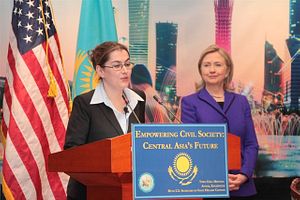If the State Department’s recent “Country Report on Terrorism” confirms anything, it is the lack of import Central Asia maintains in D.C.’s policy circles. The region comes across as something of an afterthought in the write-up, especially in comparison to the South Asian analyses contained in the same report. Considering Washington’s current policies in the region – or lack thereof – perhaps this shouldn’t come as much of a surprise.
Nonetheless, a few trends and tidbits within the report are worth noting. For instance, as EurasiaNet’s Joshua Kucera noted, prior skepticism about terror threats in Central Asia are “less apparent in this report’s newly written sections on ISIS.” Indeed, ISIS is mentioned in the context of all nations, except Turkmenistan, both in terms of recruiting practices and governmental responses. Central Asian governments have been more than eager to play up threats from ISIS – which Washington has been happy to oblige in certain instances – but the report doesn’t contain much new information on either presence or governmental restriction.
One thing the report does provide, however, is copious (and welcome) criticism for ineffective or repressive practices spun as regional anti-terror tactics. In Tajikistan, for instance, the report noted that “many of the government’s measures … have had a negative impact on religious freedoms, including prohibiting children under 18 from attending mosque or other public religious services and banning women from worshiping in mosques.” Dushanbe has also opted for “selectively blocking social media sites, rather than issuing a counter-narrative” – the latter of which will grow that much more difficult with the effective dissolution of Tajikistan’s only mainstream Islamic party. In Turkmenistan, “severe curtailment of basic freedoms, growing economic inequality, an ideological void among young people, and the perception of corruption could cause people to be attracted to violent extremist ideologies.” And in Kyrgyzstan, the primary counterterrorism organ “lacks both specialized training and equipment. Interagency cooperation and coordination is sporadic.”
Interestingly, the heaviest criticism was levied at the country who the U.S. has done the most outwardly to support in its push against regional terrorism – Uzbekistan. The report highlights numerous individuals caught in the maw of Uzbekistan’s repressive policies, often under the guise of anti-terror tactics. As the report reads, “Uzbekistani law enforcement authorities frequently use the terms ‘terrorism’ or ‘extremism’ interchangeably. … ‘Religious extremism’ is the primary justification for Uzbekistan’s seemingly indiscriminate police actions against religious adherents, especially Muslims.” Tashkent “prioritizes regime stability over domestic freedom of expression, including political dissent, and uses law enforcement to maintain internal security at the expense of some fundamental freedoms.” Moreover, it remains unclear where the delineation of anti-terror tactics and outright repression stands: “A lack of reliable information … makes it difficult to differentiate between legitimate counterterrorist law enforcement actions and politically motivated arrests aimed at religious dissidents or opponents of the government.”
For some reason, Kazakhstan, despite mirroring many of the policies of its Central Asian neighbors, escaped any notable criticism in the report. Rather, the report praised Astana’s enhanced policies: “In the past, law enforcement bodies were criticized for killing rather than capturing members of suspected terrorist groups, but over the past several years have shown a greater tendency to arrest, detain, and question suspects. Security forces, including military and law enforcement, are undergoing a process of professionalization and reform with the goal of more effectively discharging their duties.” While the efficacy of such reforms remains to be seen, the lack of notable criticism, despite ample scope for it, stands – perhaps one more indication of the lack of import D.C. brings to Central Asian analysis.
































